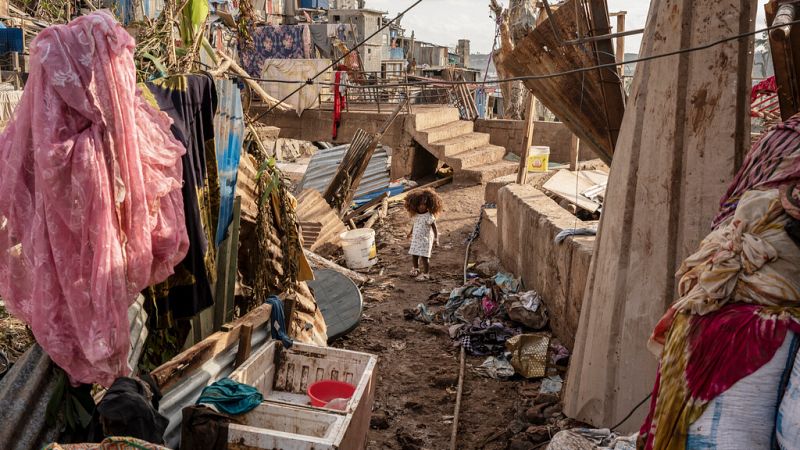Mayotte: Amidst criticism, Emmanuel Macron defends the state's actions

"I cannot allow it to be said... that the state has failed here," declared French President Emmanuel Macron upon his arrival on Thursday in cyclone-hit Mayotte.
President Macron visited the ndian Ocean archipelago, a French territory, to assess the extent of the disaster and offer his support to the people of Mayotte, five days after the devastating passage of Cyclone Chido.
He also announced plans to "rebuild" Mayotte, while also calling for a "strengthening of the fight against illegal immigration" in the territory.
Macron arrived with a small delegation, including around twenty doctors, nurses, logisticians, and civil security personnel, as well as with four tonnes of food and medical supplies.
Upon his arrival, Assane Haloi, an employee at the security of the Petite-Terre airport where the president landed, urged Macron to extend his stay on French soil and to find emergency solutions and assistance.
"Please, not solutions, but urgent assistance, urgently. Take your time, stay with us, give us solutions and emergency aid. There is nothing left in Mayotte," she pleaded.
"There are no roofs, there is nothing. No water, no food, no electricity. We can't even shelter. We and our children are all drenched from the rain, and we cover ourselves with what we have so we can sleep," she said, asking for emergency help.
Emmanuel Macron boarded a helicopter for an aerial assessment of the damage. He then went to a hospital in Mamoudzou, the capital of Mayotte, to meet with medical staff and patients. A French Navy ship was also expected to arrive with 180 tonnes of aid and equipment, according to the French military.
Fears of hundreds dead, possibly thousands
Some residents also expressed their anxiety about not knowing whether people have died or gone missing, particularly due to the Muslim practice of burying the dead within 24 hours.
Estelle Youssoufa, a legislator from Mayotte, said: "We are dealing with open-air mass graves. There are no rescuers, no one has come to recover the buried bodies."
Some survivors and aid groups described rushed burials and the foul smell of the bodies.
President Macron acknowledged that many deaths had not been reported. He stated that telephone services would be restored "in the coming days" so people could report the disappearance of their loved ones.
French authorities confirmed at least 31 deaths, but this number is expected to be much higher. There are fears that hundreds, if not thousands of people have perished.
It is difficult to establish an accurate toll because the majority of Mayotte's population is Sunni Muslim, who bury the dead within 24 hours, making it hard to determine the number of casualties. There are also fears that many people are still buried under the debris scattered across the island.
Mayotte, located in the Indian Ocean between the eastern coast of mainland Africa and the northern part of Madagascar, is the poorest territory in France.
The cyclone devastated entire neighbourhoods, as many people ignored warnings thinking the storm wouldn't be as severe. According to the French government, Mayotte's population is more than 320,000. Most residents are Muslim, with French authorities estimating an additional 100,000 other migrants live there.
Mayotte is the only part of the Comoros archipelago that voted in favour of joining France during the 1974 referendum. Over the last decade, the French territory has seen a massive influx of migrants arriving from the neighbouring Comoros islands, an independent nation, and one of the poorest countries in the world.
Other migrants come from as far as Somalia, with some hoping to reach continental Europe.
Yesterday

